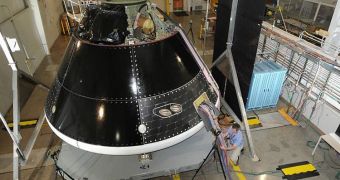Officials at NASA have recently announced plans to exhibit the space shuttle Discovery alongside a full-scale, test model of the Orion Multi-Purpose Crew Vehicle (MPCV), at the Steven F. Udvar-Hazy Center, in Chantilly, Virginia.
The installation is located near the Washington Dulles International Airport, and belongs to the Smithsonian National Air and Space Museum. The latter was selected last year as the Discovery's final place of exhibit.
According to the announcement, the MPCV model will be just one of many NASA-sponsored exhibits to accompany the famous shuttle into its new home. Discovery is scheduled to fly over Washington, DC, today (April 17), on its way to the Smithsonian from the Kennedy Space Center, in Florida.
The ceremony where NASA will transfer the shuttle to the museum will take place on April 19. The agency says that the Orion capsule will not remain with Discovery permanently, but rather between April 19-22.
In addition to the actual vehicle, the organization will also dispatch some of its scientists and engineers to discuss the MPCV with media and the public. Alongside the shuttle and the new capsule, NASA will present dozens of other exhibits.
These will include a showcase of the International Space Station (ISS), and presentations of a solar telescope, a new spacesuit, an inflatable rover from the Mars Science Laboratory series, and so on.
“The Orion test vehicle was used in the Pad Abort-1 Test in 2010, which saw the successful flight of Orion's launch abort system. This escape capability will protect future crews in the event of an emergency during launch,” a NASA press release on the issue announces.
At this point, the agency plans to launch the first “real” Orion as early as 2014. The Exploration Flight Test-1 (EFT-1) will demonstrate the viability of the overall design, and reveal whether this capsule can be used to explore near-Earth asteroids and the Red Planet.
Orion is being developed to work in conjunction with the new Space Launch System (SLS), a heavy-lift rocket that is scheduled to undergo its first test flight in 2017. Together, these spacecraft replaced all components of the now-canceled Project Constellation.

 14 DAY TRIAL //
14 DAY TRIAL //